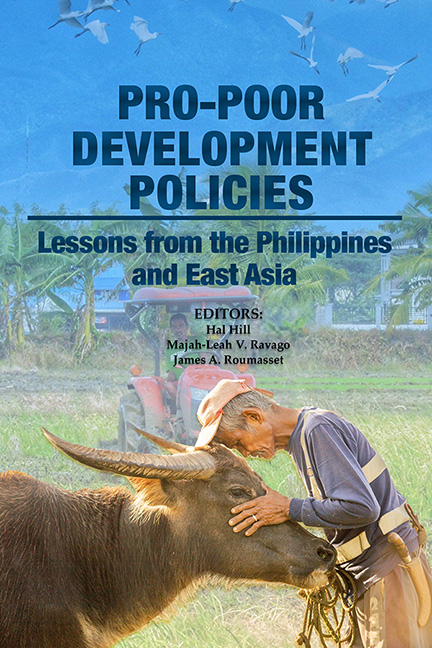Book contents
- Frontmatter
- Dedication
- Contents
- Figures, Tables and Boxes
- Foreword
- Foreword
- Message
- Preface and Acknowledgements
- About the Editors
- About the Contributors
- Acronyms
- Part 1 Introduction and Synthesis
- Part 2 Agricultural and Economic Development
- Part 3 Economic Policies for Achieving Targeted Levels of Living in the Philippines
- Part 4 Inequality and Economic Development
- Part 5 Competition Law and Policy
- Part 6 International Dimensions
- Index
14 - An Essay on Markets, Distributive Justice and Social Safety Nets
Published online by Cambridge University Press: 09 January 2024
- Frontmatter
- Dedication
- Contents
- Figures, Tables and Boxes
- Foreword
- Foreword
- Message
- Preface and Acknowledgements
- About the Editors
- About the Contributors
- Acronyms
- Part 1 Introduction and Synthesis
- Part 2 Agricultural and Economic Development
- Part 3 Economic Policies for Achieving Targeted Levels of Living in the Philippines
- Part 4 Inequality and Economic Development
- Part 5 Competition Law and Policy
- Part 6 International Dimensions
- Index
Summary
INTRODUCTION AND OVERVIEW
I am delighted to contribute to this Festschrift in honour of Dr. Arsenio M. Balisacan, a professor of economics and colleague at the UP School of Economics, who has reached the mandatory retirement age in government. He was appointed on special detail in 2012 and served up to 2016 as director-general of the National Economic and Development Authority (NEDA) and concurrent secretary of socio-economic planning in the President’s Cabinet. As a professor, Dr. Balisacan has made important contributions to understanding poverty and income inequality in the Philippines. During his tenure at NEDA, he coordinated the preparation of the medium-term Philippine Development Plan (PDP), which has inclusive growth as theme—essentially, sustained and broad‑based economic growth. This is a timely opportunity for me to visit and explore the current challenge of growth with high income inequality and some rising episodes of such inequality in the country.
The post-World War II economic history of the Philippines shows that the real gross domestic product (GDP, adjusted for inflation) expanded about 34.4 times between 1946 and 2016—an annual real GDP growth rate of about 5.4 per cent. The GDP expansion was accompanied by high and, in some years, increasing income inequality, however. For instance, the Gini index was 0.44 in 2015 and worsened to nearly 0.48 in 2018. The basic data come from the Family Income and Expenditure Survey (FIES), which the Philippine Statistics Authority (PSA) collects and releases every three years.
Growth with high income inequality has long been a concern of the Philippine government under a succession of administrations since 1986. The inequality problem persists amid a variety of policy interventions geared towards inclusive growth. By no means has the problem been solved at this point. Is there something the Philippines can do to arrest growth with high income inequality, often decried as lack of distributive justice?
Several economists view lack of distributive justice as the result mainly of unequal distribution of initial endowments, which a market system tends to replicate across time. And so instead of interfering with the workings of markets, many economists counsel collective actions designed to correct the inequitable distribution of initial endowments.
- Type
- Chapter
- Information
- Pro-poor Development PoliciesLessons from the Philippines and East Asia, pp. 361 - 389Publisher: ISEAS–Yusof Ishak InstitutePrint publication year: 2022



